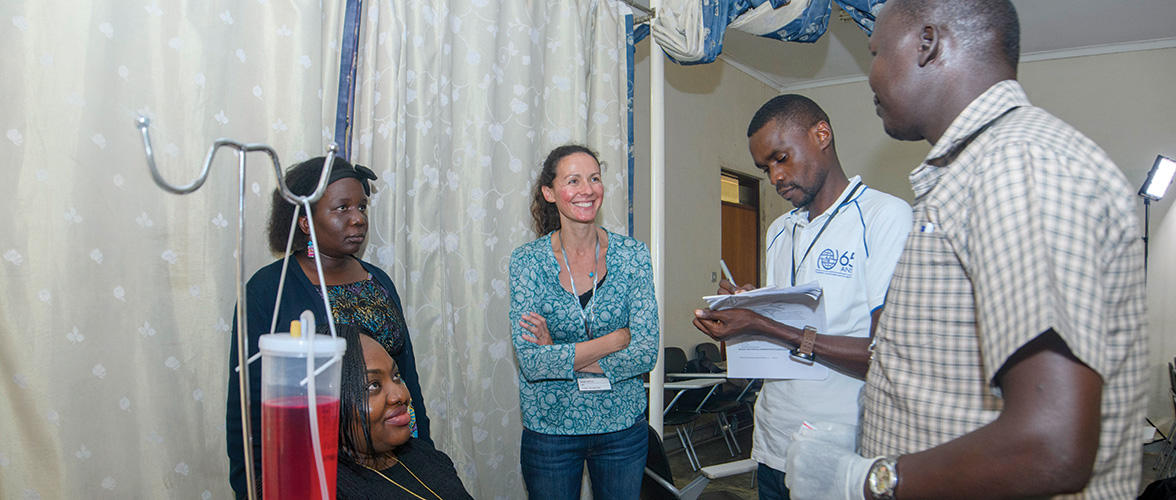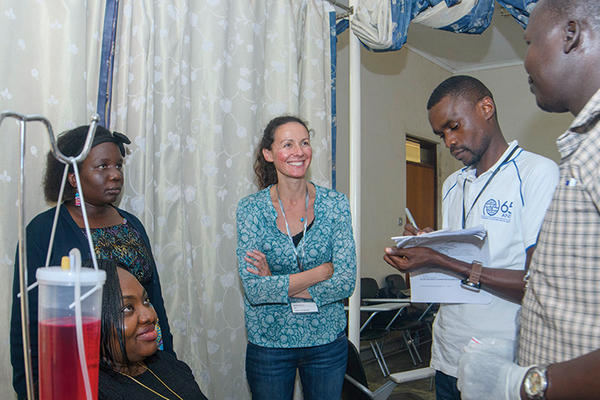UN migration agency partnership looks to improve the health of refugees
Assistant Professor Sarah Hoffman has led the nursing component of the IOM project
October 15, 2019
Steve Rudolph

In 2017, 68 million people were forcibly displaced due to conflict, persecution, violence and human rights violations.
That same year, another nearly 19 million people in 135 countries were displaced by sudden onset disasters.
For a small group of vulnerable refugees with no other options (less than 1% of refugees worldwide), the United Nations facilitates relocation to a third country. Some of these refugees are relocated to the United States through the U.S. Refugee Resettlement Program. As part of the process, refugees undergo thorough health screenings and preventative care to decrease the risk of transmissible infections, ensure a healthy resettlement and improve integration into local communities. As the population of displaced people has grown substantially in the past decade, so too has the demand for these screenings conducted by the United Nations International Organization for Migration (IOM).
To increase its capacity to perform these assessments, IOM has partnered with Centers for Disease Control and Prevention (CDC) and the University of Minnesota’s Center for Global Health & Social Responsibility. Assistant Professor Sarah Hoffman, PhD, MPH, RN, has led the nursing component of the IOM project and has facilitated train-the-trainer programs in Uganda and Thailand. These trainings have provided opportunities for nurses, public health and other health professionals from the University and Minnesota community to engage international partners in mutual benefit to understand the process of refugee resettlement, facilitate communication as refugees resettle and to learn from international colleagues.
“IOM nurses are doing incredibly advanced public health work. Our focus is to partner with these nurses to advance clinical nursing practice by strengthening teaching skill sets and effective mentorship, and examining opportunities to develop nurses in expert and leadership roles,” said Hoffman.
There are more than 500 IOM nurses and scores of physicians in these challenging settings. The settings are difficult because refugees may hide some of their medical conditions due to concerns that if they reveal them, they may not be allowed to resettle to the U.S. This places these nurses and physicians in an unusual role as they may feel they are viewed as gatekeepers in the resettlement process — although this fear is somewhat unfounded since refugees with medical conditions, to date, are allowed to resettle.
Nonetheless, Hoffman said, “They are working to understand factors surrounding health that may be hidden as a result of stigma, shame or fear. IOM providers must establish rapport and interpersonal connections with refugee clients, despite these circumstances.”
Hoffman describes her involvement with the UN Migration Agency Project as the most complex public health work that she’s been involved with. “It’s hard to anticipate what the next wave of displacement or global forced migration will look like in terms of scale or area of the world. This translates into uncertainty about how you prepare for what you will encounter from a health standpoint, as well as culturally, ethnically or linguistically in the clinics,” said Hoffman. “Success for us is supporting the development of a health care system that can be flexible and adapt to those kinds of changes.”
In developing the trainings, Hoffman and Andrew Olson, MD, associate professor from the University’s Medical School, have modeled interprofessional collaboration to reinforce the value of what that means for successful outcomes. “IOM is working to build a culture where all professions are recognized equally for what they contribute to the patient experience,” said Hoffman. “We want to model that, it has come very naturally within the project team.”
While the future of the program remains uncertain because of the current administration, Hoffman and team continue to look at ways of improving the system. Hoffman will be mentoring Shanna Miko, a Doctor of Nursing Practice student in the health innovation and leadership specialty. Miko is embarking on a fellowship in Kampala, Uganda where she will work with the IOM to help plan the future direction of the nursing training.

